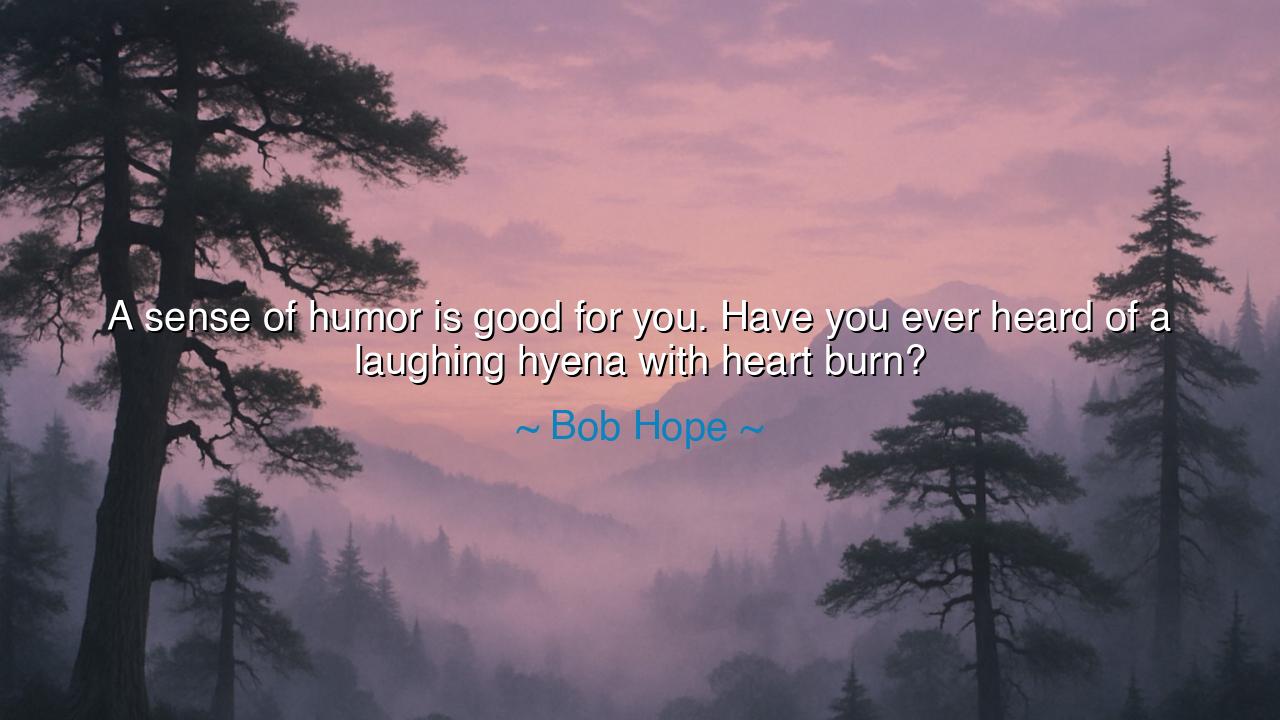
A sense of humor is good for you. Have you ever heard of a
A sense of humor is good for you. Have you ever heard of a laughing hyena with heart burn?






Hearken, children of the ages, and attend the wisdom of Bob Hope, who quipped: “A sense of humor is good for you. Have you ever heard of a laughing hyena with heart burn?” Though phrased in jest, his words conceal a profound truth: laughter is the medicine of the soul and the balm of the body. In mirth, there is release; in humor, there is healing. The spirit, lightened by laughter, bears the burdens of life more easily, and the heart, unburdened, thrives as a result. A sense of humor, when cultivated, sustains both body and soul through the trials of existence.
In the ancient courts of kings and emperors, jesters were not mere entertainers—they were physicians of the heart. Their jokes and playful observations lifted spirits weighed down by politics, conflict, and fear. In these moments of levity, even the gravest troubles seemed smaller, and men could confront adversity with clarity and courage. Just as Bob Hope likens laughter to the digestive ease of the hyena, so too did the ancients understand that the soul must be nourished by joy to endure hardship.
Consider the life of Abraham Lincoln, a man beset by sorrow and the burdens of a nation at war. Even in the gravest circumstances, he employed humor and storytelling, often using gentle wit to relieve tension, to connect with others, and to temper his own despair. In doing so, he demonstrated the healing power of a sense of humor, proving that mirth is not frivolous, but a vital force that sustains life under strain.
Even in the most dire of circumstances, laughter preserves resilience. During the trenches of the First World War, soldiers faced unimaginable suffering, yet the simplest jokes and playful stories created moments of relief. In these fleeting bursts of humor, men discovered the strength to endure hunger, cold, and the constant presence of death. Hope’s imagery of the hyena reminds us that even amidst peril, the body and spirit remain robust when laughter flows freely.
Yet, the wisdom of Hope is subtle: humor is not a cure for all suffering, but a companion to endurance. It is the instinct to lighten the spirit, to see the absurdity in the harshness of life, and to release tension before it becomes corrosive. Those who cultivate a sense of humor are fortified against despair, their hearts and minds remaining resilient where others might falter. Laughter, in this sense, is medicine, exercise, and armor all at once.
History offers another illustration in the life of Charlie Chaplin. Facing poverty, rejection, and the turbulence of a changing world, he used humor as both a weapon and a shield. His laughter, expressed through performance and creation, lightened his spirit and those of countless others. In Chaplin’s life, we see Hope’s wisdom embodied: humor preserves the heart, allowing it to endure what might otherwise consume it.
Children of the ages, the lesson is clear: cultivate a sense of humor as a daily practice. Observe life keenly, notice the absurdities and paradoxes that surround you, and allow yourself to meet difficulty with laughter as a companion. In doing so, you strengthen your spirit, ease the burdens of the heart, and fortify your resilience against the inevitable trials of existence.
Practical action follows naturally. Engage with life playfully, share light-hearted observations with others, and do not take every misfortune to heart. Keep a journal of amusing insights, tell stories that bring smiles, and seek moments of mirth in ordinary days. By nurturing a sense of humor, as Bob Hope teaches, you cultivate a shield for the soul, a tonic for the body, and a pathway to enduring joy in the face of life’s adversities.






AAdministratorAdministrator
Welcome, honored guests. Please leave a comment, we will respond soon